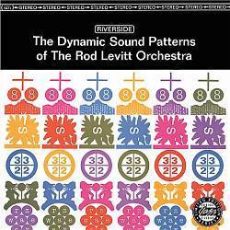
Daily Dose Of Jazz…
Rodney Charles Levitt was born on September 16, 1929 in Portland, Oregon and studied composition at the University of Washington, where he took his BA in 1951.
He was in the Radio City Music Hall orchestra from 1957 to 1963, and during those years he performed with Dizzy Gillespie, Ernie Wilkins, Kai Winding, and Sy Oliver. In 1959 Rod worked with Gil Evans when his orchestra accompanied Miles Davis. The following year he played with Gerry Mulligan and Mundell Lowe, with Quincy Jones in ‘61, and with Oliver Nelson in 1962.
He recorded four albums as a leader of an octet between 1963-66 and continued to work with this combination into the 1970s, when he played with bassist Chuck Israels.
Later in his career he worked with Cedar Walton and Blue Mitchell, and wrote music for commercials with a company he ran from 1966-1989. The late Seventies saw him teaching at Fairleigh Dickinson, Hofstra University, CUNY, and Hunter College.
Trombonist, composer, and bandleader Rod Levitt transitioned from Alzheimer’s disease in Wardsboro, Vermont at the age of 77 on May 8, 2007.
More Posts: bandleader,composer,history,instrumental,jazz,music,trombone
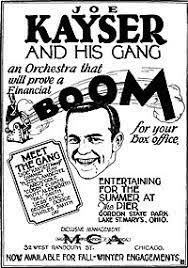
Daily Dose Of Jazz…
Joe Kayser was born St. Louis, Missouri on September 14, 1891 and at age 26 in 1917 he relocated to New York City to join Earl Fuller’s band, which played at a restaurant called Rector’s. He enlisted in the U.S. Navy during World War I, forming a band which included Benny Kubelsky on violin. Following the war, the Meyer Davis Organization hired him to lead a dance band which played in North and South Carolina.
Forming his own self-named dance jazz band in 1921 and shortly after he attempted to tour across the Carolinas. Three years later he relocated to Chicago, Illinois where his band performed through 1936.
During those Chicago days Joe began in 1929 to take positions as musical director of theater orchestras with the Diversey Theater in Chicago, followed by the Midland Theatre in Kansas City, Missouri. He continued to tour with his orchestra while holding these positions.
He played at the 1933 World’s Fair, accompanying Sally Rand but by 1963 had dissolved the band to work for NBC. Afterwards Kayser became an executive for MCA in 1943, remaining there until his retirement in 1955.
Drummer and bandleader Joe Kayser transitioned on October 3, 1981 in Evanston, Illinois.
More Posts: bandleader,drums,history,instrumental,jazz,music
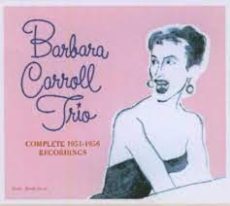
Daily Dose Of Jazz…
Joseph Shulman was born on September 12, 1923 in New York, New York. His first professional experience was with Scat Davis in 1940 followed with a stint alongside Les Brown in 1942.
Joining the military in 1943 he recorded with Django Reinhardt while a member of Glenn Miller’s wartime band. Upon his return to the States he played with Buddy Rich and Claude Thornhill, then he played with Miles Davis on the Birth of the Cool sessions.
He went on to work with Peggy Lee from 1948 to 1950 and with Lester Young in 1950. Shulman did a recording session with Billy Strayhorn and Duke Ellington that same year.
Marrying Barbara Carroll in 1954, the two toured together until his death. Bassist Joe Shulman transitioned from a heart attack on August 2, 1957 in New York City.
More Posts: bandleader,bass,history,instrumental,jazz,music
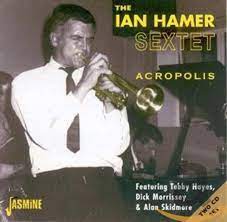
Daily Dose Of Jazz…
Ian Wilfred Hamer was born on September 11, 1932 in Liverpool, England, the son of a successful Merseyside dance band leader. Together with his two brothers he played in the band run by his mother until serving in the Royal Air Force.
Moving to London, England in 1953 he worked for clarinettist Carl Barriteau and for a brief period with the Oscar Rabin Band. For a year beginning in 1955 he was part of the Tubby Hayes octet then later joined the Vic Ash quintet. In 1963, together with Harry South, he led a band called The Six Sounds, featuring Ken Wray and Dick Morrissey. By 1966 the band had developed into the Ian Hamer Sextet. In 1966 Ian joined the Top of the Pops studio orchestra conducted by Johnny Pearson.
Hamer played in big bands led by Tubby Hayes, Ted Heath, Mike Gibbs, Jack Parnell and Harry South. He also played with Kenny Wheeler, Dizzy Gillespie, Ella Fitzgerald, as well as in smaller bands with Stan Tracey, Benny Golson, Lalo Schifrin, Gary McFarland, Woody Herman’s Anglo-American Herd, Barbara Thompson, the Thad Jones-Mel Lewis band, Eric Delaney, John Dankworth and Joe Harriott.
As a session musician, he played on recordings by The Beatles, Bing Crosby, Tom Jones, Dusty Springfield, Shirley Bassey, Barbra Streisand, James Last, Matt Monro, and Peter Herbolzheimer. Ian played trumpet on the theme tune for The Sweeney, written and arranged by Harry South.
In 1987, Hamer moved to Brighton, England and founded the group Ian Hamer and the Sussex Youth Jazz Orchestra, later dropping Youth. On September 3, 2006, trumpeter Ian Hamer transitioned in Brighton at 73.
More Posts: bandleader,history,instrumental,jazz,music,trumpet
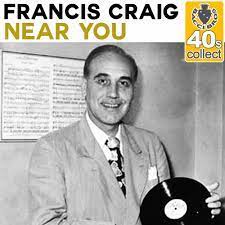
Daily Dose Of Jazz…
Francis Craig was the son of a minister born on September 10, 1900 in Dickson, Tennessee. He studied mathematics and political science at Vanderbilt University in Nashville, Tennessee. While he was at Vanderbilt, he formed an orchestra, the Vanderbilt Jazz Band. When the university’s chancellor told him to change the name of the group, disband it, or leave Vanderbilt, he dropped out and changed the orchestra’s name.
Craig went on to have three stints on WSM radio in Nashville and his Francis Craig Orchestra played on the station from 1926 to 1928 and again in 1935~1939. He returned to the station in 1947 to work as a disc jockey on the program Featured by Francis Craig. He also worked on WGN in Chicago, Illinois, in 1940.
The recording of his own composition Near You was released by Bullet Records and reached the Billboard Best Seller chart in 1947, peaked at #1 and lasted 21 weeks on the chart. It was the first pop hit record ever to come out of Nashville. His other compositions were Dynamite, Beg Your Pardon and Red Rose, among others.
Songwriter, pianist and dance band leader Francis Craig, who played honky~tonk transitioned at age 66 on November 19, 1966, in Sewanee, Tennessee.
More Posts: bandleader,history,instrumental,jazz,music,piano


